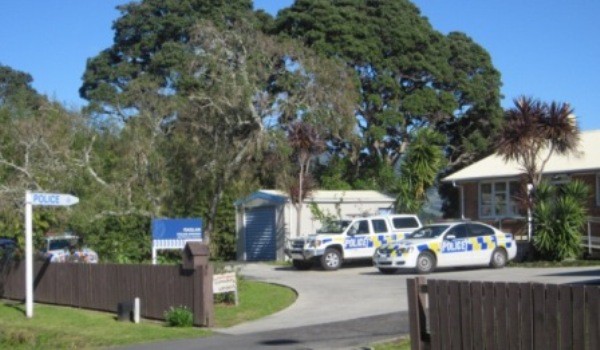Kia Ora, This is the first bulletin (17.11.2015) of hopefully, a weekly sharing from Neighbourhood Support, including a report from Raglan Police in support of our community sharing what criminal activity has occurred over the previous week thus inviting us all to assist in calling a halt to it. In a caring community, if any member is a victim of crime, then all are victims.
 Police Report:
Police Report:
Occurrences are:
Cases of wilful damage:
Waitetuna School damage to sports gear. – A bike tampered with in Bow Street. – A letter box on Wainui Road.
Family Violence
There have been four cases of family violence.
Stolen Items
A Mobile phone was stolen from John Street.
Taggers
Sadly, our town is again beset by taggers. Someone is responsible and someone knows who is responsible. Anyone knowing has a moral an obligation to get it stopped.
Stop Signs
Police would like to make it very clear that they are going to be pulling up anyone not stopping at stop signs. A $150 fine will be given on the spot!
Neighbourhood Support aims to make our homes, streets, neighbourhoods and communities safer and more caring places in which to live. Neighbourhood Support New Zealand Incorporated provides support for all neighbourhood and rural support groups throughout New Zealand.
Local Raglan Coordinator is Kathy Gilbert email: raglannslists@gmail.com. On the other hand, to contact Kathy by phone please call either 07 8258142 The Raglan House (Community Centre) or the Police Station on 07 8258200 and leave contact details for her.
Reducing the burglar’s opportunities
Knowing how a burglar thinks and operates is good background information to help put things in place to prevent you or someone you know becoming a burglary victim.
The following information outlines some practical and simple steps to reduce the risk of being burgled:
- Set up or join a Neighbourhood Support Group in your area and advertise the fact by displaying Neighbourhood Support signs and stickers.
- Make sure doors, windows, and other entry and exit points from your house have good quality, effective catches, and locks – deadlocks if possible. Get into the habit of always using these locks
- Always lock doors and windows at night, if you’re out in the garden or going out or away. Don’t leave a door key hidden outside – burglars know all the places to look
- Keep garden sheds and garages secure and lock away tools and ladders
- Have an alarm system professionally installed and consider having it monitored by a reputable security company
- Install sensor lights on access paths or around main external doors
- Install a ‘peep-hole’ in a front door so you know who’s visiting you
- Ask unannounced visitors who they are and what they want. If you’re not satisfied with their answer, don’t open the door to them
- Trim trees or remove shrubbery which might ‘hide’ a burglar’s activity
- Get to know your neighbours and develop plans to deal with problems or suspicious activity. Exchanging phone numbers or emergency contact details is a good start.
- If you’re going away, neighbours can collect your mail or newspaper and make your place look occupied, for example by turning on lights, parking a vehicle in your driveway, hanging washing on your line or mowing lawns
- Mark valuable property with serial numbers and keep a record of these numbers
- Consider placing “Beware of Dog” signs on gates or fences
- If you have an answer phone, don’t record a message that suggests you’re out or alone.
- Police are always interested in suspicious activity. Don’t hesitate to call Police to report something out of the ordinary and, if you see a crime being committed, call 111.
Above all, remember burglars like easy, tempting opportunities. DON’T overlook the obvious and DO all you can to reduce the risk of being burgled.
If you or someone you know has been burgled, it is best to take immediate action to improve the security of your home and reduce the risk of being burgled again.
If you do see, someone acting suspiciously in your neighbourhood ask yourself the following questions.
- Have I seen this person in the neighbourhood before? [If you live in a cul-de-sac or a more rural location a non-local will be immediately obvious]
- Does s/he look comfortable doing what they’re doing?
- Is there a sense of purpose to the person’s activity? Do they look like they’re going somewhere? Are they hesitant or even loitering?
- What does the person appear to be looking at and why?
- How did the person come to be in the area? Is there a car nearby, and if s/he is some distance from it, why? What’s the car registration number?
Answering these questions and even taking notes about the person’s appearance, clothes, height, or other distinguishing features can go a long way toward identifying a crime suspect and making your neighbourhood a safer place to live.
Summary:
Folks our town has the ability to empower all to live in harmony in our cultural diversity. If we see, any criminal behaviour we need to help stop it. Education can occur at home. Have a conversation within the family, and discuss how you would like our community to care for one another. Make a stand for nil criminal behaviour.
One of the recent worrying sights is gang colours suddenly appearing. Many years ago, Mongrel Mob leader Bubba Riki stated that there would be no gang violence, criminal behaviour, or wearing of colours in this town. He would not tolerate it. He stood for peace and empowering the young to get an education and work skills. He has recently passed to the realms above. If you see young people taking to wearing gang colours, share with them how they are dishonouring this wise leader.
Summer is upon us! Enjoy our beautiful community and keep yourselves and the community safe.
Arohanui
Kathy Gilbert

